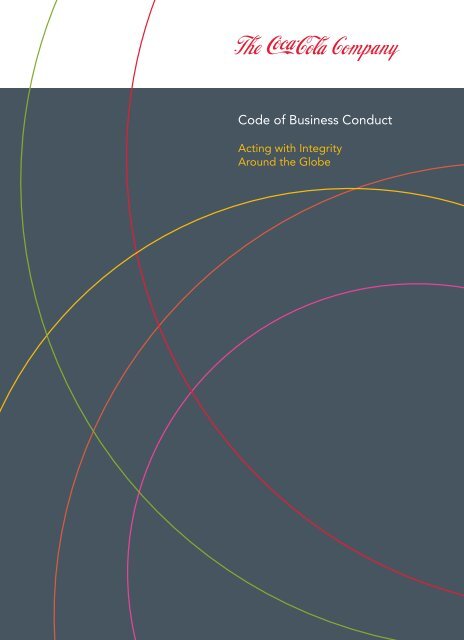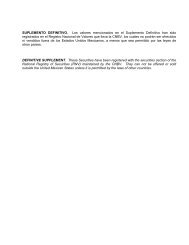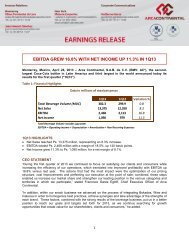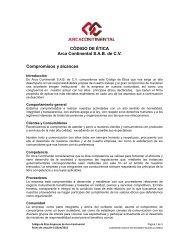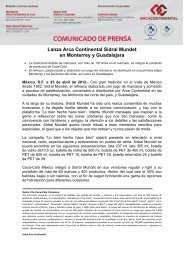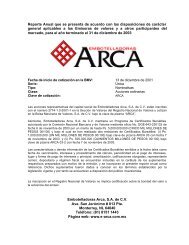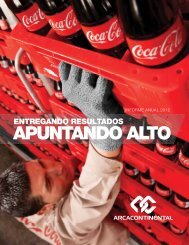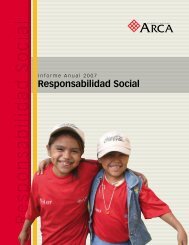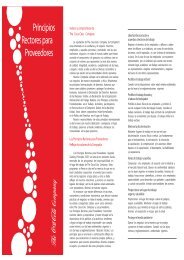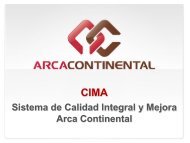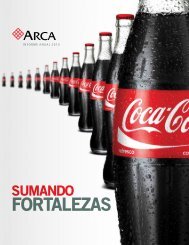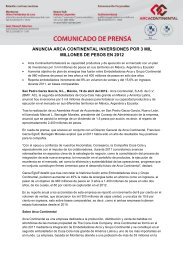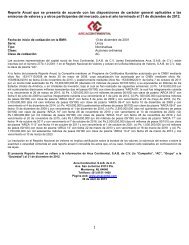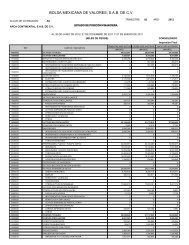Code of Business Conduct - The Coca-Cola Company
Code of Business Conduct - The Coca-Cola Company
Code of Business Conduct - The Coca-Cola Company
Create successful ePaper yourself
Turn your PDF publications into a flip-book with our unique Google optimized e-Paper software.
<strong>Code</strong> <strong>of</strong> <strong>Business</strong> <strong>Conduct</strong><br />
Acting with Integrity<br />
Around the Globe
Act with integrity.<br />
Be honest.<br />
Follow the law.<br />
Comply with the <strong>Code</strong>.<br />
Be accountable.
Dear Colleague:<br />
COCA-COLA PLAZA<br />
ATLANTA, GEORGIA<br />
We live in an era when public trust and confidence in business are among the lowest<br />
levels in history. We at <strong>The</strong> <strong>Coca</strong>-<strong>Cola</strong> <strong>Company</strong> are fortunate, LINE ART / SOLID however, PRINT COLORS to work for one<br />
<strong>of</strong> the most admired businesses in the world – a reputation that has been enhanced and<br />
safeguarded over the years by a rich culture <strong>of</strong> integrity and ethical conduct.<br />
Our business is built on this trust and this reputation. It influences how consumers feel<br />
about our products, and how shareowners perceive us as an investment. We have seen<br />
plenty <strong>of</strong> examples in recent years <strong>of</strong> powerful companies with once stalwart reputations<br />
tarnished forever by unethical actions <strong>of</strong> a few people or even just one person. As former<br />
<strong>Company</strong> Board member Warren Buffett once reminded us, “it takes years to build a<br />
reputation and only a few seconds to ruin it.”<br />
Because our success is so closely related to our reputation, it’s up to all <strong>of</strong> us to protect<br />
that reputation.<br />
Acting with integrity is about more than our <strong>Company</strong>’s image and reputation, or<br />
avoiding legal issues. It’s about sustaining a place where we all are proud to work.<br />
Ultimately, it’s about each <strong>of</strong> us knowing that we have done the right thing. This means<br />
acting honestly and treating each other and our customers, partners, suppliers and<br />
consumers fairly, and with dignity.<br />
<strong>The</strong> <strong>Code</strong> <strong>of</strong> <strong>Business</strong> <strong>Conduct</strong> is our guide to appropriate conduct. Together with other<br />
<strong>Company</strong> guidelines, such as our Workplace Rights Policy, we have set standards to<br />
ensure that we all do the right thing. Keep the <strong>Code</strong> with you and refer to it <strong>of</strong>ten. Stay<br />
current with your ethics training. When you have questions, ask for guidance.<br />
With your help, I am confident that our <strong>Company</strong> will continue to deserve the trust that<br />
everyone has in us. Our reputation for integrity will endure. Thank you for joining me<br />
in this effort.<br />
Sincerely,<br />
Muhtar Kent<br />
Chairman and CEO<br />
April 2009<br />
COKE<br />
RED<br />
PANTONE<br />
BLACK
<strong>Code</strong> <strong>of</strong> <strong>Business</strong> <strong>Conduct</strong><br />
Contents<br />
Acting with Integrity Around<br />
the Globe ....................................... 3<br />
What Is Expected <strong>of</strong> Everyone .................4<br />
What Is Expected <strong>of</strong> Managers ................5<br />
When Written Approval Is Required ........6<br />
Raising Concerns ......................................8<br />
Resources<br />
Anonymity and Confidentiality<br />
Investigations<br />
No Retaliation<br />
Integrity in the <strong>Company</strong> ............. 11<br />
<strong>Business</strong> and Financial Records ..............11<br />
<strong>Company</strong> Assets ....................................13<br />
Use <strong>of</strong> Time, Equipment and Other Assets<br />
Loans<br />
Use <strong>of</strong> Information .................................16<br />
Nonpublic Information<br />
Insider Trading<br />
Privacy<br />
Conflicts <strong>of</strong> Interest...................... 21<br />
Outside Investments ..............................21<br />
Outside Employment, Speeches<br />
and Presentations ..................................22<br />
Outside Service as an Officer<br />
or Director .............................................23<br />
Relatives and Friends .............................24<br />
Gifts, Meals and Entertainment .............26<br />
Integrity in Dealing with Others .. 29<br />
Dealing with Governments ...................29<br />
Anti-Bribery<br />
Political Activity<br />
Trade Restrictions<br />
Dealing with Customers, Suppliers<br />
and Consumers .....................................34<br />
Dealing with Competitors .....................35<br />
Competition Law<br />
Competitive Intelligence<br />
Addenda ...................................... 39<br />
Administration <strong>of</strong> the <strong>Code</strong> ...................39<br />
Responsibility<br />
Investigation <strong>of</strong> Potential <strong>Code</strong> Violations<br />
Decisions<br />
Disciplinary Actions<br />
Reporting <strong>of</strong> <strong>Code</strong> Decisions<br />
and Investigations<br />
Signature and Acknowledgement<br />
Question or concern? Log on to EthicsLine at www.KOethics.com<br />
Waivers<br />
Glossary ................................................41<br />
Resources ..............................................43<br />
Ethics & Compliance Intranet Site<br />
Policies and Guidelines<br />
Ethics & Compliance Office
Acting with Integrity<br />
4 What Is Expected <strong>of</strong> Everyone<br />
5 What Is Expected <strong>of</strong> Managers<br />
6 When Written Approval<br />
Is Required<br />
8 Raising Concerns
Acting with Integrity Around the Globe<br />
Integrity is fundamental to <strong>The</strong> <strong>Coca</strong>-<strong>Cola</strong> <strong>Company</strong>.<br />
Along with our other values <strong>of</strong> leadership, passion,<br />
accountability, collaboration, diversity and quality,<br />
it is a pillar <strong>of</strong> our Manifesto for Growth.<br />
Integrity means doing what is right. By acting with<br />
integrity, we reflect positively on the image and reputation<br />
<strong>of</strong> the <strong>Company</strong> and its brands in the over 200 countries<br />
where we operate.<br />
We all want to do what is right, for ourselves and for<br />
<strong>The</strong> <strong>Coca</strong>-<strong>Cola</strong> <strong>Company</strong>. <strong>The</strong> <strong>Code</strong> <strong>of</strong> <strong>Business</strong> <strong>Conduct</strong><br />
will help guide us. <strong>The</strong> <strong>Code</strong> defines how employees<br />
should conduct themselves as representatives <strong>of</strong><br />
<strong>The</strong> <strong>Coca</strong>-<strong>Cola</strong> <strong>Company</strong>. <strong>The</strong> <strong>Code</strong> addresses our<br />
responsibilities to the <strong>Company</strong>, to each other, and to<br />
customers, suppliers, consumers and governments.<br />
We all must follow the law, act with integrity and honesty<br />
in all matters, and be accountable for our actions.<br />
Question or concern? Log on to EthicsLine at www.KOethics.com<br />
3
4<br />
Acting with Integrity Around the Globe<br />
What Is Expected <strong>of</strong> Everyone<br />
Comply with the <strong>Code</strong> and the Law<br />
Understand the <strong>Code</strong>. Comply with the <strong>Code</strong> and the law wherever you are. Use<br />
good judgment and avoid even the appearance <strong>of</strong> improper behavior.<br />
Consider Your Actions, and Ask for Guidance<br />
If ever in doubt about a course <strong>of</strong> conduct, ask yourself:<br />
• Is it consistent with the <strong>Code</strong>?<br />
• Is it ethical?<br />
• Is it legal?<br />
• Will it reflect well on me and the <strong>Company</strong>?<br />
• Would I want to read about it in the newspaper?<br />
If the answer is “No” to any <strong>of</strong> these questions, don’t do it.<br />
If you are still uncertain, ask for guidance. <strong>The</strong> <strong>Code</strong> tries to capture many <strong>of</strong> the<br />
situations that employees will encounter, but cannot address every circumstance.<br />
You can seek help from any <strong>of</strong> the following:<br />
• Your management<br />
• <strong>Company</strong> legal counsel or senior finance personnel supporting<br />
your business<br />
• Your Local Ethics Officer<br />
• <strong>The</strong> Ethics & Compliance Office<br />
Or you can use EthicsLine. EthicsLine is available at www.KOethics.com, or by<br />
calling toll-free using the access codes that can be found on the website.<br />
Note on the Glossary:<br />
Throughout the <strong>Code</strong>, certain words and phrases appear in red. <strong>The</strong>se<br />
terms are defined in the Glossary at the end <strong>of</strong> this document.
What Is Expected <strong>of</strong> Managers<br />
Promote a Culture <strong>of</strong> Ethics and Compliance<br />
Managers should at all times model appropriate conduct. As a manager, you should:<br />
• Ensure that the people you supervise understand their responsibilities<br />
under the <strong>Code</strong> and other <strong>Company</strong> policies.<br />
• Take opportunities to discuss the <strong>Code</strong> and reinforce the importance <strong>of</strong><br />
ethics and compliance with employees.<br />
• Create an environment where employees feel comfortable raising concerns.<br />
• Consider conduct in relation to the <strong>Code</strong> and other <strong>Company</strong> policies when<br />
evaluating employees.<br />
• Never encourage or direct employees to achieve business results at the<br />
expense <strong>of</strong> ethical conduct or compliance with the <strong>Code</strong> or the law.<br />
• Always act to stop violations <strong>of</strong> the <strong>Code</strong> or the law by those<br />
you supervise.<br />
Respond to Questions and Concerns<br />
If approached with a question or concern related to the <strong>Code</strong>, listen carefully<br />
and give the employee your complete attention. Ask for clarification and<br />
additional information. Answer any questions if you can, but do not feel that you<br />
must give an immediate response. Seek help if you need it. If an employee raises<br />
a concern that may require investigation under the <strong>Code</strong>, contact <strong>Company</strong> legal<br />
counsel, senior finance personnel or the Ethics & Compliance Office.<br />
Question or concern? Log on to EthicsLine at www.KOethics.com<br />
5
6<br />
Acting with Integrity Around the Globe<br />
When Written Approval Is Required<br />
Certain actions referenced in the <strong>Code</strong>—specifically, use <strong>of</strong> <strong>Company</strong> assets<br />
outside <strong>of</strong> your employment and certain conflict <strong>of</strong> interest situations—require<br />
prior written approval from your Local Ethics Officer. You must renew this<br />
approval annually if the situation continues. Your Local Ethics Officer is an<br />
employee at the Group, <strong>Business</strong> Unit or appropriate Bottling Investments level<br />
who has been appointed to make these determinations. You can find your Local<br />
Ethics Officer listed on the Ethics & Compliance intranet site, or you can ask<br />
your Human Resources representative to identify your Local Ethics Officer.<br />
If you are in a situation where Local Ethics Officer approval is required, you can<br />
contact your Local Ethics Officer directly, or you may first notify your manager,<br />
who can help you seek the necessary approval. An online tool is available on<br />
the Ethics & Compliance intranet site to facilitate the approval process.<br />
For those who are themselves Local Ethics Officers, approval must come from<br />
the General Counsel and Chief Financial Officer <strong>of</strong> <strong>The</strong> <strong>Coca</strong>-<strong>Cola</strong> <strong>Company</strong>.<br />
Written approvals for executive <strong>of</strong>ficers must come from the Chief Executive<br />
Officer, and written approval for the Chief Executive Officer must come from<br />
the Board <strong>of</strong> Directors or its designated committee.
Who Must Follow the <strong>Code</strong>?<br />
<strong>The</strong> <strong>Code</strong> <strong>of</strong> <strong>Business</strong> <strong>Conduct</strong> applies to all employees <strong>of</strong> <strong>The</strong> <strong>Coca</strong>-<strong>Cola</strong> <strong>Company</strong><br />
and its majority-owned subsidiaries. Use <strong>of</strong> the terms “<strong>The</strong> <strong>Coca</strong>-<strong>Cola</strong> <strong>Company</strong>” and<br />
“the <strong>Company</strong>” throughout this document refers collectively to all <strong>of</strong> these entities.<br />
<strong>The</strong> <strong>Code</strong> and the Law<br />
<strong>Company</strong> operations and <strong>Company</strong> employees are subject to the laws <strong>of</strong> many countries<br />
and other jurisdictions around the world. Employees are expected to comply with the<br />
<strong>Code</strong> and all applicable government laws, rules and regulations. If a provision <strong>of</strong> the<br />
<strong>Code</strong> conflicts with applicable law, the law controls.<br />
Because <strong>The</strong> <strong>Coca</strong>-<strong>Cola</strong> <strong>Company</strong> is incorporated in the United States, our employees<br />
around the world <strong>of</strong>ten are subject to U.S. laws. Other countries also may apply their<br />
laws outside their borders to <strong>Company</strong> operations and personnel. If you are uncertain<br />
what laws apply to you, or if you believe there may be a conflict between different<br />
applicable laws, consult <strong>Company</strong> legal counsel before proceeding.<br />
Question or concern? Log on to EthicsLine at www.KOethics.com<br />
7
8<br />
Acting with Integrity Around the Globe<br />
Raising Concerns<br />
We all have an obligation to uphold the ethical standards <strong>of</strong> <strong>The</strong> <strong>Coca</strong>-<strong>Cola</strong><br />
<strong>Company</strong>. If you observe behavior that concerns you, or that may represent a<br />
violation <strong>of</strong> our <strong>Code</strong>, raise the issue promptly. Doing so will allow the <strong>Company</strong> an<br />
opportunity to deal with the issue and correct it, ideally before it becomes a violation<br />
<strong>of</strong> law or a risk to health, security or the <strong>Company</strong>’s reputation.<br />
Resources<br />
You have several options for raising issues and concerns. You can contact any <strong>of</strong><br />
the following:<br />
• Your management<br />
• <strong>Company</strong> legal counsel or senior finance personnel supporting your business<br />
• In the case <strong>of</strong> potential criminal conduct, Strategic Security in Atlanta<br />
• Your Local Ethics Officer<br />
• <strong>The</strong> Ethics & Compliance Office<br />
You also can use EthicsLine at www.KOethics.com or make a toll-free call using the<br />
access code for your country available on the website.<br />
• EthicsLine reports can be made anonymously.<br />
• EthicsLine is available 24 hours a day, seven days a week.<br />
• Translators are available.<br />
• EthicsLine reports are forwarded to the Ethics & Compliance Office.<br />
European Union Exception<br />
Many European Union countries limit the types <strong>of</strong> reports that EthicsLine can accept.<br />
Specific limitations are described on the Ethics & Compliance intranet site and on the<br />
EthicsLine website.
Anonymity and Confidentiality<br />
When you make a report to the Ethics & Compliance Office or through EthicsLine, you<br />
may choose to remain anonymous, although you are encouraged to identify yourself<br />
to facilitate communication. If you make your identity known, the Ethics & Compliance<br />
Office and investigators will take every reasonable precaution to keep your identity<br />
confidential, consistent with conducting a thorough and fair investigation. To help<br />
maintain confidentiality, avoid discussing these issues, or any investigation, with other<br />
employees. Because we strive to maintain strict confidentiality in all investigations, we<br />
may not be able to inform you <strong>of</strong> the outcome <strong>of</strong> an investigation.<br />
Investigations<br />
<strong>The</strong> <strong>Company</strong> takes all reports <strong>of</strong> possible misconduct seriously. We will investigate<br />
the matter confidentially, make a determination whether the <strong>Code</strong> or the law has been<br />
violated, and take appropriate corrective action. If you become involved in a <strong>Code</strong><br />
investigation, cooperate fully and answer all questions completely and honestly.<br />
No Retaliation<br />
<strong>The</strong> <strong>Company</strong> values the help <strong>of</strong> employees who identify potential problems that the<br />
<strong>Company</strong> needs to address. Any retaliation against an employee who raises an issue<br />
honestly is a violation <strong>of</strong> the <strong>Code</strong>. That an employee has raised a concern honestly,<br />
or participated in an investigation, cannot be the basis for any adverse employment<br />
action, including separation, demotion, suspension, loss <strong>of</strong> benefits, threats, harassment<br />
or discrimination.<br />
If you work with someone who has raised a concern or provided information in an<br />
investigation, you should continue to treat the person with courtesy and respect. If<br />
you believe someone has retaliated against you, report the matter to the Ethics &<br />
Compliance Office or use EthicsLine.<br />
Making False Accusations<br />
<strong>The</strong> <strong>Company</strong> will protect any employee who raises a concern honestly, but it is a<br />
violation <strong>of</strong> the <strong>Code</strong> to knowingly make a false accusation, lie to investigators, or<br />
interfere or refuse to cooperate with a <strong>Code</strong> investigation. Honest reporting does not<br />
mean that you have to be right when you raise a concern; you just have to believe that<br />
the information you are providing is accurate.<br />
Question or concern? Log on to EthicsLine at www.KOethics.com<br />
9
Integrity in the <strong>Company</strong><br />
Acting with integrity begins within<br />
<strong>The</strong> <strong>Coca</strong>-<strong>Cola</strong> <strong>Company</strong>, and includes<br />
how we deal with <strong>Company</strong> records,<br />
assets and information.<br />
11 <strong>Business</strong> and Financial Records<br />
13 <strong>Company</strong> Assets<br />
16 Use <strong>of</strong> Information
Integrity in the <strong>Company</strong><br />
<strong>Business</strong> and Financial Records<br />
Ensure the accuracy <strong>of</strong> all <strong>Company</strong> business and financial records. <strong>The</strong>se<br />
include not only financial accounts, but other records such as quality reports,<br />
time records, expense reports and submissions such as benefits claim forms<br />
and resumes.<br />
Ensuring accurate and complete business and financial records is everyone’s<br />
responsibility, not just a role for accounting and finance personnel. Accurate<br />
recordkeeping and reporting reflects on the <strong>Company</strong>’s reputation and credibility,<br />
and ensures that the <strong>Company</strong> meets its legal and regulatory obligations.<br />
• Always record and classify transactions in the proper accounting period and<br />
in the appropriate account and department. Do not delay or accelerate the<br />
recording <strong>of</strong> revenue or expenses to meet budgetary goals.<br />
• Estimates and accruals must be supported by appropriate documentation<br />
and be based on your best judgment.<br />
• Ensure that all reports to regulatory authorities are full, fair, accurate, timely<br />
and understandable.<br />
• Never falsify any document.<br />
• Do not distort the true nature <strong>of</strong> any transaction.<br />
• Never enable another person’s efforts to evade taxes or subvert local<br />
currency laws. For this reason, payments generally should be made only to<br />
the person or firm that actually provided the goods or services. Payments<br />
should be made in the supplier’s home country, where it does business,<br />
or where the goods were sold or services provided, unless the supplier<br />
legitimately has assigned payment or sold its accounts receivable to another<br />
entity. Exceptions must be approved by the Ethics & Compliance Office.<br />
Question or concern? Log on to EthicsLine at www.KOethics.com<br />
11
12<br />
Integrity in the <strong>Company</strong><br />
<strong>Business</strong> and Financial Records (continued)<br />
Strive for Accuracy<br />
Employees must strive to be accurate when preparing any information<br />
for the <strong>Company</strong>, but honest mistakes occasionally will happen. Only<br />
intentional efforts to misrepresent or improperly record transactions, or<br />
otherwise to falsify a <strong>Company</strong> business record, are <strong>Code</strong> violations.<br />
EXAMPLES<br />
Medical Coverage<br />
An employee attempted to obtain <strong>Company</strong> medical coverage for her<br />
adult children by submitting a form claiming that her children were fulltime<br />
students. In fact, her children were no longer students. <strong>The</strong> employee<br />
falsified <strong>Company</strong> records.<br />
Revenue Recognition<br />
A sales manager estimated that he would not meet his targets for the month.<br />
To make up the difference, he hired an external warehouse to receive<br />
product and then recorded shipments to the warehouse as sales. <strong>The</strong> sales<br />
manager falsified financial records.
<strong>Company</strong> Assets<br />
Protect the <strong>Company</strong>’s assets, and use those assets in the manner intended.<br />
Do not use <strong>Company</strong> assets for your personal benefit or the benefit <strong>of</strong><br />
anyone other than the <strong>Company</strong>.<br />
• Use common sense. For example, the occasional personal phone call<br />
or e-mail from your workplace is acceptable. Excessive personal calls<br />
or e-mail is a misuse <strong>of</strong> assets.<br />
• <strong>Company</strong> policy may allow additional personal use <strong>of</strong> certain assets, such<br />
as a <strong>Company</strong> car or wireless communication device. Always check relevant<br />
local policies to ensure that you are using <strong>Company</strong> assets as intended.<br />
<strong>The</strong>ft <strong>of</strong> <strong>Company</strong> assets—whether physical theft such as unauthorized<br />
removal <strong>of</strong> <strong>Company</strong> product, equipment or information, or theft through<br />
embezzlement or intentional misreporting <strong>of</strong> time or expenses—may result<br />
in termination and criminal prosecution. <strong>The</strong> <strong>Company</strong> treats workplace<br />
theft <strong>of</strong> assets belonging to other employees the same way it treats theft <strong>of</strong><br />
<strong>Company</strong> assets.<br />
<strong>The</strong> use <strong>of</strong> <strong>Company</strong> assets outside <strong>of</strong> your <strong>Company</strong> responsibilities—<br />
such as using your <strong>Company</strong> work product in an outside venture, or using<br />
<strong>Company</strong> materials or equipment to support personal interests—requires prior<br />
written approval from your Local Ethics Officer. You must have this approval<br />
renewed annually if you continue to use the asset outside <strong>of</strong> work.<br />
Question or concern? Log on to EthicsLine at www.KOethics.com<br />
13
14<br />
Integrity in the <strong>Company</strong><br />
<strong>Company</strong> Assets (continued)<br />
Use <strong>of</strong> Time, Equipment and Other Assets<br />
• Do not engage in personal activities during work hours that interfere with or<br />
prevent you from fulfilling your job responsibilities.<br />
• Do not use <strong>Company</strong> computers and equipment for outside businesses,<br />
or for illegal or unethical activities such as gambling, pornography or other<br />
<strong>of</strong>fensive subject matter. Refer to the Acceptable Use Policy for additional<br />
information and guidance.<br />
• Do not take for yourself any opportunity for financial gain that you learn<br />
about because <strong>of</strong> your position at the <strong>Company</strong>, or through the use <strong>of</strong><br />
<strong>Company</strong> property or information.<br />
Loans<br />
Examples <strong>of</strong> <strong>Company</strong> Assets<br />
• <strong>Company</strong> money<br />
• <strong>Company</strong> product<br />
• Employees’ time at work and work product<br />
• Computer systems and s<strong>of</strong>tware<br />
• Telephones<br />
• Wireless communication devices<br />
• Photocopiers<br />
• Tickets to concerts or sporting events<br />
• <strong>Company</strong> vehicles<br />
• Proprietary information<br />
• <strong>Company</strong> trademarks<br />
Loans from the <strong>Company</strong> to executive <strong>of</strong>ficers are prohibited. Loans from the<br />
<strong>Company</strong> to other <strong>of</strong>ficers and employees must be approved in advance by<br />
the Board <strong>of</strong> Directors or its designated committee.
EXAMPLES<br />
A Personal Favor<br />
An employee used <strong>Company</strong> computers and equipment, as well as time at work, to design<br />
and print wedding invitations and birth announcements as a favor for other employees. <strong>The</strong><br />
employee misused <strong>Company</strong> assets.<br />
Teaching<br />
Q: I am a marketing manager and have volunteered to teach a course on marketing at a local<br />
college. I believe that my students would benefit from a discussion <strong>of</strong> how the <strong>Company</strong><br />
developed several marketing campaigns. Can I discuss this work in class?<br />
A: Only with prior approval from your Local Ethics Officer. <strong>The</strong> development <strong>of</strong> marketing<br />
campaigns is a <strong>Company</strong> work product and a <strong>Company</strong> asset. Much <strong>of</strong> this work may be<br />
proprietary, and may not be appropriate to reveal outside the <strong>Company</strong>.<br />
Personal Assistance<br />
A manager persistently asked an administrative assistant to take care <strong>of</strong> the manager’s personal<br />
business on <strong>Company</strong> time, such as picking up dry cleaning, balancing a personal checkbook<br />
and shopping for personal gifts. <strong>The</strong> manager misused the assistant’s work time, which is a<br />
<strong>Company</strong> asset.<br />
Ticket Swap<br />
A marketing employee had access to <strong>Company</strong> tickets to sporting events to be used for<br />
consumer promotions. <strong>The</strong> employee sent some <strong>of</strong> the tickets to an acquaintance working at a<br />
hotel chain in exchange for free hotel rooms for the employee’s personal use. <strong>The</strong> employee<br />
misused <strong>Company</strong> assets.<br />
Question or concern? Log on to EthicsLine at www.KOethics.com<br />
15
16<br />
Integrity in the <strong>Company</strong><br />
Use <strong>of</strong> Information<br />
Safeguard the <strong>Company</strong>’s nonpublic information, which includes<br />
everything from contracts and pricing information to marketing plans,<br />
technical specifications and employee information.<br />
Nonpublic Information<br />
Do not disclose nonpublic information to anyone outside the <strong>Company</strong>,<br />
including to family and friends, except when disclosure is required for<br />
business purposes. Even then, take appropriate steps, such as execution <strong>of</strong><br />
a confidentiality agreement, to prevent misuse <strong>of</strong> the information.<br />
Do not disclose nonpublic information to others inside the <strong>Company</strong> unless<br />
they have a business reason to know, and communications have been<br />
classified according to the Information Protection Policy.<br />
Employees are obligated to protect the <strong>Company</strong>’s nonpublic information<br />
at all times, including outside <strong>of</strong> the workplace and working hours, and even<br />
after employment ends.<br />
Retain or discard <strong>Company</strong> records in accordance with the <strong>Company</strong>’s<br />
record retention policies. <strong>Company</strong> legal counsel occasionally may issue<br />
notices regarding retention <strong>of</strong> records in the case <strong>of</strong> actual or threatened<br />
litigation or government investigation. Employees must abide by the<br />
directions contained in these notices, as failure to do so could subject the<br />
<strong>Company</strong> and employees to serious legal risks.<br />
Refer to the Information Protection Policy for additional guidance and tips<br />
for safeguarding information.
What Is Nonpublic Information?<br />
It is any information that the <strong>Company</strong><br />
has not disclosed or made generally<br />
available to the public. Examples include<br />
information related to:<br />
• Employees<br />
• Inventions<br />
• Contracts<br />
• Strategic and business plans<br />
• Major management changes<br />
• New product launches<br />
• Mergers and acquisitions<br />
• Technical specifications<br />
• Pricing<br />
• Proposals<br />
• Financial data<br />
• Product costs<br />
EXAMPLES<br />
Look What I Have<br />
Q: I have just received by accident an<br />
e-mail with a file containing the<br />
salaries <strong>of</strong> several other employees.<br />
May I share it with other people<br />
at work?<br />
A: No. You and your friends at work<br />
have no business reason to have<br />
this information. You should delete<br />
the e-mail and bring the error to the<br />
sender’s attention. Disclosing the<br />
information to other employees is a<br />
<strong>Code</strong> violation.<br />
A New Formula<br />
A <strong>Company</strong> scientist was excited<br />
about the upcoming launch <strong>of</strong> a new<br />
product that the scientist had worked<br />
on, and shared details about the<br />
product with family and friends.<br />
<strong>The</strong> scientist improperly disclosed<br />
nonpublic information.<br />
Question or concern? Log on to EthicsLine at www.KOethics.com<br />
17
18<br />
Integrity in the <strong>Company</strong><br />
Use <strong>of</strong> Information (continued)<br />
Insider Trading<br />
Trading in stocks or securities based on material nonpublic information, or<br />
providing material nonpublic information to others so that they may trade,<br />
is illegal and may result in prosecution. Refer to the Insider Trading Policy<br />
for additional information.<br />
EXAMPLE<br />
A Small <strong>Company</strong><br />
Q: I have learned that the <strong>Company</strong> is considering the acquisition <strong>of</strong> a<br />
small, publicly-traded beverage company. May I acquire the stock<br />
<strong>of</strong> this company in anticipation <strong>of</strong> the acquisition?<br />
A: No. Trading on material nonpublic information is illegal and a<br />
violation <strong>of</strong> the <strong>Code</strong>, whether you are trading in the stock <strong>of</strong><br />
<strong>The</strong> <strong>Coca</strong>-<strong>Cola</strong> <strong>Company</strong> or the stock <strong>of</strong> another company.
Privacy<br />
<strong>The</strong> <strong>Company</strong> respects the privacy <strong>of</strong> all its employees, business partners<br />
and consumers. We must handle personal data responsibly and in<br />
compliance with all applicable privacy laws. Employees who handle the<br />
personal data <strong>of</strong> others must:<br />
• Act in accordance with applicable law;<br />
• Act in accordance with any relevant contractual obligations;<br />
• Collect, use and process such information only for legitimate<br />
business purposes;<br />
• Limit access to the information to those who have a legitimate<br />
business purpose for seeing the information; and<br />
• Take care to prevent unauthorized disclosure.<br />
Refer to the Privacy Policy for additional guidance on the handling <strong>of</strong><br />
personal data and a description <strong>of</strong> protected information.<br />
Question or concern? Log on to EthicsLine at www.KOethics.com<br />
19
Conflicts <strong>of</strong> Interest<br />
This section <strong>of</strong> the <strong>Code</strong> provides rules<br />
for some common conflict <strong>of</strong> interest<br />
situations. <strong>The</strong> <strong>Code</strong> cannot address every<br />
potential conflict <strong>of</strong> interest, so use your<br />
conscience and common sense. When you<br />
are unsure, seek guidance.<br />
21 Outside Investments<br />
22 Outside Employment, Speeches<br />
and Presentations<br />
23 Outside Service as an Officer<br />
or Director<br />
24 Relatives and Friends<br />
26 Gifts, Meals and Entertainment
Conflicts <strong>of</strong> Interest<br />
Act in the best interest <strong>of</strong> <strong>The</strong> <strong>Coca</strong>-<strong>Cola</strong> <strong>Company</strong><br />
while performing your job for the <strong>Company</strong>. A conflict<br />
<strong>of</strong> interest arises when your personal activities and<br />
relationships interfere, or appear to interfere, with<br />
your ability to act in the best interest <strong>of</strong> the <strong>Company</strong>.<br />
Take particular care if you are responsible for selecting<br />
or dealing with a supplier on behalf <strong>of</strong> the <strong>Company</strong>.<br />
Your personal interests and relationships must not<br />
interfere, or appear to interfere, with your ability to make<br />
decisions in the best interest <strong>of</strong> the <strong>Company</strong>. When<br />
selecting suppliers, always follow applicable <strong>Company</strong><br />
procurement guidelines.<br />
Outside Investments<br />
Avoid investments that could affect, or appear to affect,<br />
your decision making on behalf <strong>of</strong> the <strong>Company</strong>. Specific<br />
guidelines apply to ownership <strong>of</strong> stock <strong>of</strong> a customer,<br />
supplier or competitor <strong>of</strong> <strong>The</strong> <strong>Coca</strong>-<strong>Cola</strong> <strong>Company</strong><br />
(Note: Franchise bottlers <strong>of</strong> <strong>Company</strong>-trademarked<br />
products are customers.):<br />
• If you have discretionary authority in dealing with<br />
a company as part <strong>of</strong> your job with <strong>The</strong> <strong>Coca</strong>-<strong>Cola</strong><br />
<strong>Company</strong>, you may not have any financial interest<br />
in that company without prior written approval from<br />
your Local Ethics Officer.<br />
• If you do not have discretionary authority in dealing<br />
with a company as part <strong>of</strong> your job, you may own up<br />
to 1% <strong>of</strong> the stock <strong>of</strong> the company.<br />
• You may own more than 1% <strong>of</strong> the stock <strong>of</strong> any<br />
customer, supplier or competitor only with the prior<br />
written approval <strong>of</strong> your Local Ethics Officer.<br />
• You must renew Local Ethics Officer approval<br />
annually if you continue to own the stock.<br />
Question or concern? Log on to EthicsLine at www.KOethics.com<br />
Determining Conflicts<br />
<strong>of</strong> Interest<br />
In any potential conflict<br />
<strong>of</strong> interest situation, ask<br />
yourself:<br />
• Could my personal interests<br />
interfere with those <strong>of</strong> the<br />
<strong>Company</strong>?<br />
• Might it appear that way<br />
to others, either inside or<br />
outside <strong>of</strong> the <strong>Company</strong>?<br />
When unsure, seek guidance.<br />
Mutual Funds<br />
<strong>The</strong>se restrictions on<br />
outside investments do<br />
not apply to mutual funds<br />
or similar investments in<br />
which the employee does<br />
not have direct control over<br />
the particular companies<br />
included in the fund.<br />
21
22<br />
Conflicts <strong>of</strong> Interest<br />
Outside Employment, Speeches and Presentations<br />
In general, you may be employed outside <strong>of</strong> <strong>The</strong> <strong>Coca</strong>-<strong>Cola</strong> <strong>Company</strong>, as long as<br />
your outside employment does not interfere with your ability to do your job with<br />
the <strong>Company</strong>. Refer also to local employment policies and contracts, which may<br />
impose additional restrictions.<br />
You may not be employed by, or otherwise provide services for or receive payment<br />
from, any customer, supplier or competitor <strong>of</strong> the <strong>Company</strong> without prior written<br />
approval from your Local Ethics Officer. You must renew this approval annually.<br />
You must have prior written approval from your Local Ethics Officer before<br />
accepting reimbursement for expenses, or any other payment, for speeches or<br />
presentations outside <strong>The</strong> <strong>Coca</strong>-<strong>Cola</strong> <strong>Company</strong>, if:<br />
• You are giving the speech or presentation as part <strong>of</strong> your job with<br />
the <strong>Company</strong>;<br />
• <strong>The</strong> speech or presentation describes your work with the <strong>Company</strong>; or<br />
• You are formally identified at the speech or presentation as an employee<br />
<strong>of</strong> the <strong>Company</strong>.
Outside Service as an Officer or Director<br />
In general, you may serve as an <strong>of</strong>ficer or member <strong>of</strong> the board <strong>of</strong> directors <strong>of</strong><br />
another for-pr<strong>of</strong>it business only with prior written approval <strong>of</strong> your Local Ethics<br />
Officer. You must renew this approval annually.<br />
Local Ethics Officer approval is not required for:<br />
• Service as an <strong>of</strong>ficer or director <strong>of</strong> another company, such as a bottler, at the<br />
request <strong>of</strong> <strong>The</strong> <strong>Coca</strong>-<strong>Cola</strong> <strong>Company</strong> (other approvals may be necessary in such<br />
a case, however, per the Delegation <strong>of</strong> Authority); or<br />
• Service as an <strong>of</strong>ficer or director <strong>of</strong> a charitable or other non-pr<strong>of</strong>it institution<br />
or trade organization, or for service as an <strong>of</strong>ficer or director <strong>of</strong> a family-owned<br />
business, unless the business is a customer, supplier or competitor <strong>of</strong> the<br />
<strong>Company</strong>.<br />
Refer to the Director Appointee Guidelines for more information on the obligations<br />
<strong>of</strong> those serving as <strong>of</strong>ficers or directors <strong>of</strong> other for-pr<strong>of</strong>it businesses.<br />
Serving as a Director at the Request <strong>of</strong> <strong>The</strong> <strong>Coca</strong>-<strong>Cola</strong> <strong>Company</strong><br />
If you serve as a director <strong>of</strong> another company, such as a bottler, at the request <strong>of</strong> <strong>The</strong><br />
<strong>Coca</strong>-<strong>Cola</strong> <strong>Company</strong>, you may own up to 1% <strong>of</strong> the stock <strong>of</strong> that company without<br />
Local Ethics Officer approval if stock ownership is required as a condition <strong>of</strong> service<br />
as a director. If you serve as a director <strong>of</strong> another company at the request <strong>of</strong> <strong>The</strong><br />
<strong>Coca</strong>-<strong>Cola</strong> <strong>Company</strong> and receive a salary for your service as a director, you may<br />
retain the salary if the other company is publicly traded, but must remit the salary to<br />
<strong>The</strong> <strong>Coca</strong>-<strong>Cola</strong> <strong>Company</strong> if the other company is privately held.<br />
Question or concern? Log on to EthicsLine at www.KOethics.com<br />
23
24<br />
Conflicts <strong>of</strong> Interest<br />
Who Is My “Relative”<br />
Under the <strong>Code</strong>?<br />
A spouse, parent, sibling,<br />
grandparent, child, grandchild,<br />
mother- or father-in-law, or<br />
same or opposite sex domestic<br />
partner are all considered<br />
relatives. Also included is<br />
any family member who lives<br />
with you or who is otherwise<br />
financially dependent on<br />
you, or on whom you are<br />
financially dependent. Even<br />
when dealing with family<br />
members beyond this<br />
definition, take care to ensure<br />
that your relationship does<br />
not interfere, or appear to<br />
interfere, with your ability to<br />
act in the best interest <strong>of</strong> <strong>The</strong><br />
<strong>Coca</strong>-<strong>Cola</strong> <strong>Company</strong>.<br />
Relatives and Friends<br />
Many employees have relatives who are employed by<br />
or invest in customers or suppliers <strong>of</strong> <strong>The</strong> <strong>Coca</strong>-<strong>Cola</strong><br />
<strong>Company</strong>. <strong>The</strong>se financial interests do not create a<br />
conflict under the <strong>Code</strong> unless:<br />
• You have discretionary authority in dealing with<br />
any <strong>of</strong> these companies as part <strong>of</strong> your job with<br />
<strong>The</strong> <strong>Coca</strong>-<strong>Cola</strong> <strong>Company</strong>; or<br />
• Your relative deals with <strong>The</strong> <strong>Coca</strong>-<strong>Cola</strong> <strong>Company</strong><br />
on behalf <strong>of</strong> the other company.<br />
In either <strong>of</strong> these situations, you must have written<br />
approval from your Local Ethics Officer, and you must<br />
renew this approval annually.<br />
If your relative is employed by a competitor <strong>of</strong> the<br />
<strong>Company</strong>, you must seek written approval from your<br />
Local Ethics Officer, and renew it annually.<br />
You may have friends who are employed by, or have<br />
ownership interests in, customers or suppliers <strong>of</strong> <strong>The</strong><br />
<strong>Coca</strong>-<strong>Cola</strong> <strong>Company</strong>. If you deal with such a customer<br />
or supplier, take care to ensure that your friendship<br />
does not affect, or appear to affect, your ability to act<br />
in the best interest <strong>of</strong> the <strong>Company</strong>. If you are uncertain<br />
whether your friendship may create an issue, consult<br />
your manager, Local Ethics Officer or the Ethics &<br />
Compliance Office.<br />
In addition, personal relationships at work must not<br />
influence your ability to act in the best interest <strong>of</strong><br />
the <strong>Company</strong>, and must not affect any employment<br />
relationship. Employment-related decisions should<br />
be based on qualifications, performance, skills<br />
and experience.
EXAMPLES<br />
Supplier Selection<br />
Q: It is my job to select a supplier for the <strong>Company</strong>. One <strong>of</strong> the<br />
suppliers being considered is a company owned by my spouse.<br />
Do I need to take any precautions?<br />
A: In this situation, your interest in your spouse’s business conflicts—<br />
or at least appears to conflict—with your responsibility to select<br />
the best supplier for <strong>The</strong> <strong>Coca</strong>-<strong>Cola</strong> <strong>Company</strong>. You should consult<br />
your manager and Local Ethics Officer. <strong>The</strong> best course <strong>of</strong> action is<br />
either for you not to be involved in the selection process, or for your<br />
spouse’s business to be eliminated from consideration.<br />
My Brother<br />
Q: My brother works for <strong>Company</strong> X, which is one <strong>of</strong> our customers,<br />
but he has no dealings with <strong>The</strong> <strong>Coca</strong>-<strong>Cola</strong> <strong>Company</strong>. I work in<br />
Sales, but have had no contact with <strong>Company</strong> X. I now have been<br />
asked to manage the <strong>Company</strong> X account. What should I do?<br />
A: Tell your manager about your brother’s employment, because in<br />
your new job you will have discretionary authority in dealing<br />
with <strong>Company</strong> X. If your manager still wants you to work on<br />
the <strong>Company</strong> X account, seek written approval from your Local<br />
Ethics Officer.<br />
Question or concern? Log on to EthicsLine at www.KOethics.com<br />
25
26<br />
Conflicts <strong>of</strong> Interest<br />
Gifts, Meals and Entertainment<br />
Do not accept gifts, meals or entertainment, or any other favor, from customers or suppliers<br />
if doing so might compromise, or appear to compromise, your ability to make objective<br />
business decisions in the best interest <strong>of</strong> <strong>The</strong> <strong>Coca</strong>-<strong>Cola</strong> <strong>Company</strong>.<br />
Acceptance <strong>of</strong> gifts, meals or entertainment that exceeds the following limitations must<br />
be approved in writing by your Local Ethics Officer.<br />
Gifts<br />
• Do not accept gifts in exchange for doing, or promising to do, anything for a customer<br />
or supplier.<br />
• Do not ask for gifts from a customer or supplier.<br />
• Do not accept gifts <strong>of</strong> cash or cash equivalents, such as gift cards.<br />
• Do not accept gifts <strong>of</strong> more than modest value. Examples <strong>of</strong> acceptable gifts include a<br />
logo pen or t-shirt, or a small gift basket at holiday time.<br />
• Gifts <strong>of</strong> symbolic value, such as trophies and statues that are inscribed in recognition <strong>of</strong> a<br />
business relationship, may be accepted.<br />
• Gifts or discounts <strong>of</strong>fered to a large group <strong>of</strong> employees as part <strong>of</strong> an agreement<br />
between the <strong>Company</strong> and a customer or supplier may be accepted and used as<br />
intended by the customer or supplier.<br />
Meals and Entertainment<br />
• Do not accept meals or entertainment in exchange for doing, or promising to do,<br />
anything for a customer or supplier.<br />
• Do not ask for meals or entertainment from a customer or supplier.<br />
• You may accept occasional meals and entertainment from customers and suppliers if<br />
the event is attended by the customer or supplier, and the costs involved are in line<br />
with local custom for business-related meals and entertainment. For example, ordinary<br />
business meals and attendance at local sporting events generally are acceptable.<br />
EXAMPLE<br />
Special Discounts<br />
An employee who was managing the <strong>Company</strong>’s relationship with a travel agency accepted from<br />
the agency discounted rates for personal travel that were not available to other employees. <strong>The</strong><br />
employee violated the <strong>Code</strong> provisions on conflicts <strong>of</strong> interest by accepting this personal benefit.
Travel and Premium Events<br />
If you are invited by a customer or supplier to an event involving out-<strong>of</strong>-town travel or<br />
overnight stay, or to a premium event such as the Olympics, World Cup, Super Bowl or<br />
Academy Awards, consult your manager to determine if there is adequate business rationale<br />
for your attendance. If there is, <strong>The</strong> <strong>Coca</strong>-<strong>Cola</strong> <strong>Company</strong> should pay for your travel and<br />
attendance at the event.<br />
Refusing Gifts, Meals and Entertainment<br />
If you are <strong>of</strong>fered a gift, meal or entertainment that exceeds the limits noted above, politely<br />
decline and explain the <strong>Company</strong>’s rules. If returning a gift would <strong>of</strong>fend the giver, or the<br />
circumstances under which it was given preclude its return, you may accept the gift, but should<br />
notify your Local Ethics Officer. <strong>The</strong> Local Ethics Officer will work with you either to donate the<br />
item to charity, or to distribute or raffle the item among a large group <strong>of</strong> employees.<br />
Gifts, Meals and Entertainment for Customers and Suppliers<br />
Gifts, meals and entertainment for customers and suppliers must support the legitimate<br />
business interests <strong>of</strong> the <strong>Company</strong> and should be reasonable and appropriate under the<br />
circumstances. Always be sensitive to our customers’ and suppliers’ own rules on receiving<br />
gifts, meals and entertainment.<br />
Do not give <strong>Company</strong> stock as a gift on behalf <strong>of</strong> the <strong>Company</strong> under any circumstances.<br />
Tickets and Housing for Personal Use<br />
Tickets to sporting events or other entertainment venues that are <strong>of</strong>fered by a customer or<br />
supplier for your personal use, without attendance by the customer or supplier, are considered<br />
gifts. <strong>The</strong>y should not be accepted, unless <strong>of</strong>fered to a large group <strong>of</strong> employees as part <strong>of</strong> an<br />
agreement between the <strong>Company</strong> and the customer or supplier. <strong>The</strong> same is true <strong>of</strong> personal use<br />
<strong>of</strong> a condominium or vacation home, or personal travel on a private aircraft.<br />
Local Rules<br />
<strong>Business</strong> Unit and Consolidated Bottling Operation management, in consultation with the Local<br />
Ethics Officer, may adopt local rules setting more specific limits on the acceptance <strong>of</strong> gifts, meals<br />
or entertainment, such as particular monetary thresholds. All local rules will be reported to the<br />
Ethics & Compliance Office, and will be posted on the Ethics & Compliance intranet site.<br />
Question or concern? Log on to EthicsLine at www.KOethics.com<br />
27
Integrity in Dealing with Others<br />
<strong>The</strong> <strong>Coca</strong>-<strong>Cola</strong> <strong>Company</strong>’s external<br />
relationships are critical to our success.<br />
We must deal fairly and lawfully with<br />
everyone we encounter.<br />
29 Dealing with Governments<br />
34 Dealing with Customers,<br />
Suppliers and Consumers<br />
35 Dealing with Competitors
Integrity in Dealing with Others<br />
Dealing with Governments<br />
<strong>The</strong> global nature <strong>of</strong> our business <strong>of</strong>ten requires<br />
that we interact with <strong>of</strong>ficials <strong>of</strong> various governments<br />
around the world. Transactions with governments are<br />
covered by special legal rules, and are not the same<br />
as conducting business with private parties. Consult<br />
<strong>Company</strong> legal counsel to be certain that you are<br />
aware <strong>of</strong>, understand and abide by these rules.<br />
In general, do not <strong>of</strong>fer anything to a government<br />
<strong>of</strong>ficial—directly or indirectly—in return for favorable<br />
treatment. You must obtain prior approval from<br />
<strong>Company</strong> legal counsel before providing anything <strong>of</strong><br />
value to a government <strong>of</strong>ficial. Ensure that any such<br />
payments are properly recorded in the appropriate<br />
<strong>Company</strong> account.<br />
Anti-Bribery<br />
Many countries, including the United States, have<br />
passed legislation criminalizing bribery <strong>of</strong> government<br />
<strong>of</strong>ficials. <strong>The</strong> sanctions for violating these laws can be<br />
severe, including significant individual and corporate<br />
fines, and even imprisonment.<br />
Bribes Are Prohibited<br />
A bribe is giving or <strong>of</strong>fering to give anything <strong>of</strong> value<br />
to a government <strong>of</strong>ficial to influence a discretionary<br />
decision. Examples <strong>of</strong> bribes include payment to a<br />
government <strong>of</strong>ficial to encourage a decision to award<br />
or continue business relations, to influence the outcome<br />
<strong>of</strong> a government audit or inspection, or to influence tax<br />
or other legislation. Other payments to government<br />
<strong>of</strong>ficials also may constitute bribes in some jurisdictions.<br />
Consult <strong>Company</strong> legal counsel regarding local antibribery<br />
laws.<br />
Question or concern? Log on to EthicsLine at www.KOethics.com<br />
“Anything <strong>of</strong> Value”<br />
This phrase literally means<br />
anything that might have<br />
value to a government <strong>of</strong>ficial,<br />
including cash, gifts, meals,<br />
entertainment, business<br />
opportunities, <strong>Company</strong><br />
product, <strong>of</strong>fers <strong>of</strong> employment<br />
and more. <strong>The</strong>re is no monetary<br />
threshold; any amount could be<br />
construed as a bribe.<br />
<strong>The</strong> U.S. Foreign<br />
Corrupt Practices Act<br />
Because <strong>The</strong> <strong>Coca</strong>-<strong>Cola</strong><br />
<strong>Company</strong> is incorporated in the<br />
United States, the U.S. Foreign<br />
Corrupt Practices Act, which<br />
prohibits bribes to <strong>of</strong>ficials <strong>of</strong><br />
non-U.S. governments, applies<br />
to all employees around the<br />
world. Consult <strong>Company</strong> legal<br />
counsel about additional local<br />
laws that may be applicable.<br />
29
30<br />
Integrity in Dealing with Others<br />
Who Are<br />
Government<br />
Officials?<br />
• Employees <strong>of</strong> any<br />
government or<br />
government-controlled<br />
entity anywhere in<br />
the world<br />
• Political parties and<br />
party <strong>of</strong>ficials<br />
• Candidates for<br />
political <strong>of</strong>fice<br />
• Employees <strong>of</strong><br />
public international<br />
organizations, such as<br />
the United Nations<br />
It is your responsibility<br />
to understand whether<br />
someone you deal with<br />
is a government <strong>of</strong>ficial.<br />
When in doubt, consult<br />
<strong>Company</strong> legal counsel.<br />
Dealing with Governments<br />
Anti-Bribery (continued)<br />
Certain Payments May Be Acceptable<br />
A payment to a government <strong>of</strong>ficial may be allowable<br />
under certain narrow exceptions. Obtain approval from<br />
<strong>Company</strong> legal counsel before making any such payment. In<br />
some circumstances, legal counsel may be able to provide<br />
blanket approvals for certain well-defined interactions with<br />
government <strong>of</strong>ficials. In addition, employees should consult<br />
Public Affairs & Communication personnel responsible<br />
for government relations to ensure that they are acting in<br />
accordance with <strong>Company</strong> policy and guidelines regarding<br />
government relations.<br />
Hiring Government Officials<br />
<strong>The</strong> <strong>Company</strong> may hire government <strong>of</strong>ficials to perform<br />
services that have a legitimate business purpose, and that<br />
do not conflict with the government <strong>of</strong>ficial’s duties, such<br />
as hiring an <strong>of</strong>f-duty police <strong>of</strong>ficer to provide security at a<br />
<strong>Company</strong> event. All such hiring decisions must be approved<br />
in advance by <strong>Company</strong> legal counsel.<br />
Improper Payments by Third Parties<br />
<strong>The</strong> <strong>Company</strong> may be held liable for bribes paid by a thirdparty<br />
agent or consultant acting on the <strong>Company</strong>’s behalf.<br />
Take particular care when evaluating a prospective third<br />
party who might interact with the government on behalf<br />
<strong>of</strong> the <strong>Company</strong>. You must not engage a third-party agent<br />
or consultant if there is reason to believe that the agent or<br />
consultant may attempt to bribe a government <strong>of</strong>ficial. Also,<br />
ensure that all agents and consultants agree to abide by the<br />
<strong>Code</strong> <strong>of</strong> <strong>Business</strong> <strong>Conduct</strong> for Suppliers to <strong>The</strong> <strong>Coca</strong>-<strong>Cola</strong><br />
<strong>Company</strong>, which contains anti-bribery provisions.<br />
Refer to the Anti-Bribery Policy for more specific guidance<br />
about payments to government <strong>of</strong>ficials and engaging<br />
third parties.
Facilitating Payments<br />
<strong>The</strong> U.S. Foreign Corrupt Practices Act allows companies to make facilitating payments, which<br />
are small sums paid to non-U.S. government <strong>of</strong>ficials to expedite or facilitate non-discretionary<br />
actions or services, such as obtaining an ordinary license or phone service. At times, such<br />
payments may be necessary to obtain these services. Nonetheless, the <strong>Company</strong> discourages<br />
facilitating payments. Moreover, such payments may be illegal under local law. Always consult<br />
<strong>Company</strong> legal counsel regarding the acceptability <strong>of</strong> any facilitating payment under local law,<br />
and ensure that any facilitating payment is recorded properly in the <strong>Company</strong> accounts.<br />
EXAMPLES<br />
A Sign <strong>of</strong> Good Will<br />
Q: A public health inspector has arrived at a <strong>Company</strong> manufacturing plant. May I present a<br />
case <strong>of</strong> product to the inspector as a sign <strong>of</strong> good will?<br />
A: No. You should never give anything <strong>of</strong> value to a government <strong>of</strong>ficial without prior<br />
approval from <strong>Company</strong> legal counsel. Legal counsel would advise you that giving the<br />
product, or anything else <strong>of</strong> value, to the health inspector under these circumstances could<br />
be perceived as a bribe intended to influence the inspector’s review <strong>of</strong> the facility.<br />
Increase in Commission<br />
Q: A consultant the <strong>Company</strong> uses to assist with government relations recently asked us for a<br />
large increase in commission. I suspect the consultant may intend to pass this money on to<br />
local <strong>of</strong>ficials. What should I do?<br />
A: Report your suspicions to <strong>Company</strong> legal counsel at once. No such payments should be<br />
made to the consultant until the <strong>Company</strong> has investigated your concerns.<br />
Question or concern? Log on to EthicsLine at www.KOethics.com<br />
31
32<br />
Integrity in Dealing with Others<br />
A Political Friend<br />
Q: My friend is running for<br />
political <strong>of</strong>fice, and I<br />
would like to help with the<br />
campaign. Is this allowed?<br />
A: Yes. Your personal political<br />
activity is your business.<br />
Just make sure that you do<br />
not use <strong>Company</strong> resources,<br />
including <strong>Company</strong> time,<br />
e-mail or the <strong>Company</strong><br />
name, to advance the<br />
campaign.<br />
Dealing with Governments (continued)<br />
Political Activity<br />
<strong>The</strong> <strong>Coca</strong>-<strong>Cola</strong> <strong>Company</strong> encourages personal<br />
participation in the political process in a manner<br />
consistent with all relevant laws and <strong>Company</strong><br />
guidelines.<br />
Personal Political Activity<br />
• <strong>The</strong> <strong>Company</strong> will not reimburse employees for<br />
personal political activity.<br />
• Your job will not be affected by your personal<br />
political views or your choice in political<br />
contributions.<br />
• Do not use the <strong>Company</strong>’s reputation or assets,<br />
including your time at work, to further your own<br />
political activities or interests.<br />
• If you plan to seek or accept a public <strong>of</strong>fice,<br />
you must obtain prior approval from <strong>Company</strong><br />
legal counsel.<br />
<strong>Company</strong> Political Contributions<br />
Political contributions by the <strong>Company</strong> must be:<br />
• Made in accordance with local law;<br />
• Approved in accordance with the Delegation<br />
<strong>of</strong> Authority; and<br />
• Properly recorded.
Trade Restrictions<br />
<strong>The</strong> <strong>Company</strong> must comply with all applicable<br />
trade restrictions and boycotts imposed by the U.S.<br />
government. Such restrictions prohibit the <strong>Company</strong><br />
from engaging in certain business activities in specified<br />
countries, and with specified individuals and entities.<br />
<strong>The</strong>se restrictions include, for example, prohibitions<br />
on interaction with identified terrorist organizations<br />
or narcotics traffickers. Sanctions for non-compliance<br />
can be severe, including fines and imprisonment for<br />
responsible individuals, and the <strong>Company</strong> may be<br />
prohibited from further participation in certain trade.<br />
<strong>The</strong> <strong>Company</strong> also must abide by U.S. anti-boycott<br />
laws that prohibit companies from participating in<br />
any international boycott not sanctioned by the<br />
U.S. government.<br />
Trade Restrictions<br />
and Boycotts<br />
Question or concern? Log on to EthicsLine at www.KOethics.com<br />
Detailed information on U.S.<br />
trade restrictions that may be<br />
in effect at any given time<br />
are posted on the Ethics &<br />
Compliance intranet site. For<br />
any questions about your<br />
obligations in this area, including<br />
trade restrictions that may be<br />
imposed by governments other<br />
than the U.S., contact <strong>Company</strong><br />
legal counsel.<br />
33
34<br />
Integrity in Dealing with Others<br />
Dealing with Customers, Suppliers and Consumers<br />
<strong>The</strong> <strong>Company</strong> values its partnerships with customers, suppliers and<br />
consumers. Treat these partners in the same manner we expect to<br />
be treated.<br />
Always deal fairly with customers, suppliers and consumers, treating<br />
them honestly and with respect:<br />
• Do not engage in unfair, deceptive or misleading practices.<br />
• Always present <strong>Company</strong> products in an honest and<br />
forthright manner.<br />
We expect that our suppliers will take no action contrary to the principles<br />
<strong>of</strong> our <strong>Code</strong>. Accordingly, the owner <strong>of</strong> each supplier relationship should<br />
ensure that adherence to the <strong>Code</strong> <strong>of</strong> <strong>Business</strong> <strong>Conduct</strong> for Suppliers to<br />
<strong>The</strong> <strong>Coca</strong>-<strong>Cola</strong> <strong>Company</strong> is a condition <strong>of</strong> the supplier agreement.<br />
EXAMPLES<br />
A Lengthy Report<br />
A customer asked a sales executive to prepare a lengthy and detailed<br />
report, including product information that would take much effort to<br />
acquire. <strong>The</strong> sales executive populated the report with false data, in<br />
order to get something back to the customer quickly. <strong>The</strong>se actions were<br />
dishonest and constituted unfair treatment <strong>of</strong> a customer.<br />
A Customer Meeting<br />
Q: I am attending a customer meeting with another <strong>Company</strong> employee,<br />
and the other employee makes what I believe to be an intentionally<br />
false statement about our capabilities. What should I do?<br />
A: Correct the error during the meeting if possible. If that is not<br />
possible, raise the issue with the employee, your manager, or other<br />
responsible <strong>Company</strong> personnel after the meeting, and ensure that<br />
the <strong>Company</strong> corrects any customer misperception. If you are correct<br />
that the other employee intentionally lied to a customer, the employee<br />
violated the <strong>Code</strong>.
Dealing with Competitors<br />
Take care in dealing with competitors, and gathering information about<br />
competitors. Various laws govern these sensitive relationships.<br />
Competition Law<br />
<strong>The</strong> <strong>Coca</strong>-<strong>Cola</strong> <strong>Company</strong> competes fairly, and complies with all applicable<br />
competition laws around the world. <strong>The</strong>se laws <strong>of</strong>ten are complex, and vary<br />
considerably from country to country—both in the scope <strong>of</strong> their coverage<br />
and their geographic reach. <strong>Conduct</strong> permissible in one country may be<br />
unlawful in another. Penalties for violation can be severe.<br />
Accordingly, the <strong>Company</strong> has adopted Competition Law Guidelines<br />
applicable in various parts <strong>of</strong> the world. Employees should consult<br />
<strong>Company</strong> legal counsel and these Guidelines to understand the particular<br />
competition laws and policies applicable to them.<br />
Question or concern? Log on to EthicsLine at www.KOethics.com<br />
35
36<br />
Integrity in Dealing with Others<br />
Dealing with Competitors (continued)<br />
Competitive Intelligence<br />
Employees are encouraged to collect, share and use information about our<br />
competitors, but to do so only in a legal and ethical manner. Just as the <strong>Company</strong><br />
values and protects its own nonpublic information, we respect the nonpublic<br />
information <strong>of</strong> other companies.<br />
Acceptable Intelligence Gathering<br />
It is acceptable to collect competitive intelligence through publicly available<br />
information or ethical inquiries. For example, you may gather and use information<br />
from sources such as:<br />
• Publicly available filings with government agencies<br />
• Public speeches <strong>of</strong> company executives<br />
• Annual reports<br />
• News and trade journal articles and publications<br />
You also may ask third parties about our competitors, or accept competitive<br />
intelligence <strong>of</strong>fered by a third party, as long as there is no reason to believe that<br />
the third party is under a contractual or legal obligation not to reveal such information.<br />
Prohibited Activities<br />
<strong>The</strong> following basic restrictions apply to our ability to gather competitive intelligence:<br />
• Do not engage in any illegal or illicit activity to obtain competitive information.<br />
This includes theft, trespassing, eavesdropping, wiretapping, computer hacking,<br />
invasion <strong>of</strong> privacy, bribery, misrepresentation, coercion, espionage or threats.<br />
• Do not accept, disclose or use competitive information that you know or have<br />
reason to believe was disclosed to you in breach <strong>of</strong> a confidentiality agreement<br />
between a third party and one <strong>of</strong> our competitors.<br />
• Do not disclose or use competitive information that is, or you believe should<br />
have been, marked “proprietary” or “confidential” without consulting <strong>Company</strong><br />
legal counsel.<br />
Refer to the Competitive Intelligence Policy for more detailed guidance.
EXAMPLES<br />
A Former Employer<br />
Q: We have just hired an employee who worked very recently for one<br />
<strong>of</strong> our competitors. May I ask the employee for information about<br />
our competitor?<br />
A: Consult <strong>Company</strong> legal counsel before asking the employee<br />
anything about a former employer’s business. Never ask a former<br />
employee <strong>of</strong> a competitor about any information that the person<br />
is under a legal obligation not to reveal. This would include any<br />
<strong>of</strong> our competitor’s trade secrets, and probably other confidential<br />
information as well.<br />
A Competitor’s Proposal<br />
Q: As I prepare to propose a deal to a customer, the customer <strong>of</strong>fers<br />
me a presentation containing our competitor’s proposal so that we<br />
can respond. May I accept it?<br />
A: Perhaps. First, ask whether the customer is prohibited from sharing<br />
this information by a confidentiality agreement. If the customer<br />
confirms that it is under no obligation to protect the information,<br />
you may accept the information. Once you have the presentation,<br />
if it is marked “confidential” or “proprietary,” or you believe it<br />
should have been, consult <strong>Company</strong> legal counsel before disclosing<br />
or using the information.<br />
Question or concern? Log on to EthicsLine at www.KOethics.com<br />
37
Addenda<br />
39 Administration <strong>of</strong> the <strong>Code</strong><br />
41 Glossary<br />
43 Resources
Administration <strong>of</strong> the <strong>Code</strong><br />
<strong>The</strong> <strong>Code</strong> <strong>of</strong> <strong>Business</strong> <strong>Conduct</strong> is designed to ensure consistency in how employees<br />
conduct themselves within the <strong>Company</strong>, and in their dealings outside <strong>of</strong> the<br />
<strong>Company</strong>. <strong>The</strong> procedures for handling potential violations <strong>of</strong> the <strong>Code</strong> have been<br />
developed to ensure consistency in the process across the organization.<br />
No set <strong>of</strong> rules can cover all circumstances. <strong>The</strong>se guidelines may be varied as necessary<br />
to conform to local law or contract.<br />
Responsibility<br />
<strong>The</strong> responsibility for administering the <strong>Code</strong> rests with the Ethics & Compliance<br />
Committee, with oversight by the Chief Financial Officer, General Counsel and Audit<br />
Committee <strong>of</strong> the Board <strong>of</strong> Directors. <strong>The</strong> Ethics & Compliance Committee is comprised<br />
<strong>of</strong> senior leaders representing corporate governance functions as well as operations.<br />
Investigation <strong>of</strong> Potential <strong>Code</strong> Violations<br />
<strong>The</strong> <strong>Company</strong> takes all reports <strong>of</strong> potential <strong>Code</strong> violations seriously and is committed to<br />
confidentiality and a full investigation <strong>of</strong> all allegations. <strong>The</strong> <strong>Company</strong>’s Audit, Finance,<br />
Legal and Strategic Security personnel may conduct or manage <strong>Code</strong> investigations.<br />
Employees who are being investigated for a potential <strong>Code</strong> violation will have an<br />
opportunity to be heard prior to any final determination. <strong>The</strong> <strong>Company</strong> follows local<br />
grievance procedures in locations where such procedures apply.<br />
Decisions<br />
<strong>The</strong> Ethics & Compliance Committee makes all decisions about <strong>Code</strong> violations and<br />
discipline, but may delegate certain categories <strong>of</strong> decision to local management.<br />
Those found to have violated the <strong>Code</strong> can seek reconsideration <strong>of</strong> the violation and<br />
disciplinary action decisions.<br />
Refer to the Guidelines for Handling <strong>Code</strong> <strong>of</strong> <strong>Business</strong> <strong>Conduct</strong> Matters for more<br />
information on the <strong>Code</strong> investigation and decision-making process.<br />
Question or concern? Log on to EthicsLine at www.KOethics.com<br />
39
40<br />
Administration <strong>of</strong> the <strong>Code</strong><br />
Disciplinary Actions<br />
<strong>The</strong> <strong>Company</strong> strives to impose discipline that fits the nature and circumstances<br />
<strong>of</strong> each <strong>Code</strong> violation. <strong>The</strong> <strong>Company</strong> uses a system <strong>of</strong> progressive discipline,<br />
issuing letters <strong>of</strong> reprimand for less significant, first-time <strong>of</strong>fenses. Violations <strong>of</strong> a<br />
more serious nature may result in suspension without pay; loss or reduction <strong>of</strong> merit<br />
increase, bonus or stock option award; or termination <strong>of</strong> employment.<br />
When an employee is found to have violated the <strong>Code</strong>, notation <strong>of</strong> the final<br />
decision, and a copy <strong>of</strong> any letter <strong>of</strong> reprimand, will be placed in the employee’s<br />
personnel file as part <strong>of</strong> the employee’s permanent record.<br />
Reporting <strong>of</strong> <strong>Code</strong> Decisions and Investigations<br />
<strong>The</strong> Ethics & Compliance Office periodically reports all pending <strong>Code</strong> investigations<br />
and final <strong>Code</strong> decisions, including disciplinary actions taken, to senior management<br />
<strong>of</strong> the <strong>Company</strong> and to the Audit Committee <strong>of</strong> the Board <strong>of</strong> Directors. <strong>The</strong> Ethics<br />
& Compliance Office also posts a representative sample <strong>of</strong> <strong>Code</strong> violations, with<br />
personal identifying characteristics removed, on the Ethics & Compliance intranet<br />
site for the education <strong>of</strong> employees.<br />
Signature and Acknowledgement<br />
All new employees must sign an acknowledgement form confirming that they<br />
have read the <strong>Code</strong> <strong>of</strong> <strong>Business</strong> <strong>Conduct</strong> and agree to abide by its provisions. All<br />
employees will be required to make similar acknowledgements on a periodic basis.<br />
Failure to read the <strong>Code</strong> or sign the acknowledgement form does not excuse an<br />
employee from compliance with the <strong>Code</strong>.<br />
Waivers<br />
Waivers <strong>of</strong> any provisions <strong>of</strong> this <strong>Code</strong> for <strong>of</strong>ficers <strong>of</strong> the <strong>Company</strong> must be<br />
approved by the Board <strong>of</strong> Directors or its designated committee and will be<br />
disclosed promptly to the extent required by law.
Glossary<br />
<strong>The</strong> Glossary defines some <strong>of</strong> the terms used in the <strong>Code</strong> <strong>of</strong> <strong>Business</strong> <strong>Conduct</strong>. If<br />
these definitions or other words or phrases used in the <strong>Code</strong> are still unclear, please<br />
consult your Local Ethics Officer or the Ethics & Compliance Office.<br />
Anything <strong>of</strong> value – Anything that might have value to a government <strong>of</strong>ficial, including<br />
cash, gifts, meals, entertainment, business opportunities, <strong>Company</strong> product, <strong>of</strong>fers <strong>of</strong><br />
employment and more. <strong>The</strong>re is no monetary threshold; any amount could be construed<br />
as a bribe.<br />
Bribe – Giving or <strong>of</strong>fering to give anything <strong>of</strong> value to a government <strong>of</strong>ficial to<br />
influence a discretionary decision. Local law may impose a broader definition in some<br />
jurisdictions.<br />
<strong>Company</strong> assets – Includes, among other things, the <strong>Company</strong>’s money or product,<br />
employees’ time at work and work product, computer systems and s<strong>of</strong>tware,<br />
telephones, wireless communication devices, photocopiers, tickets to concerts and<br />
sporting events, <strong>Company</strong> vehicles, proprietary information and <strong>Company</strong> trademarks.<br />
Competitive intelligence – Information about our competitors.<br />
Competitor – For the purposes <strong>of</strong> the Conflicts <strong>of</strong> Interest and Competitive Intelligence<br />
provisions only, “competitor” means any business or entity, other than <strong>The</strong> <strong>Coca</strong>-<strong>Cola</strong><br />
<strong>Company</strong> or one <strong>of</strong> its subsidiaries or bottlers, that manufactures or sells wholesale<br />
any non-alcoholic beverage or beverage concentrate, or any business or entity that is<br />
actively considering such activity.<br />
Customer – Any business or entity to which <strong>The</strong> <strong>Coca</strong>-<strong>Cola</strong> <strong>Company</strong> or one <strong>of</strong> its<br />
subsidiaries or bottlers sells concentrate or finished product bearing a trademark <strong>of</strong><br />
<strong>The</strong> <strong>Coca</strong>-<strong>Cola</strong> <strong>Company</strong>. Franchise bottlers <strong>of</strong> <strong>Company</strong>-trademarked products are<br />
considered customers.<br />
Discretionary authority in dealing with a company – <strong>The</strong> authority to influence<br />
the <strong>Company</strong>’s selection <strong>of</strong> a supplier or to influence significantly the <strong>Company</strong>’s<br />
relationship with an existing customer or supplier.<br />
EthicsLine – <strong>The</strong> <strong>Company</strong>’s reporting service, administered by a third party, through<br />
which employees and others can ask questions or raise concerns about the <strong>Code</strong> <strong>of</strong><br />
<strong>Business</strong> <strong>Conduct</strong> or other ethics and compliance matters.<br />
Question or concern? Log on to EthicsLine at www.KOethics.com<br />
41
42<br />
Glossary<br />
Ethics & Compliance Committee – A committee comprised <strong>of</strong> senior leaders<br />
representing corporate governance functions and operations, responsible for<br />
administration <strong>of</strong> the <strong>Code</strong> <strong>of</strong> <strong>Business</strong> <strong>Conduct</strong>.<br />
Facilitating payments – Small payments to government <strong>of</strong>ficials made to expedite<br />
or facilitate non-discretionary actions or services, such as obtaining an ordinary<br />
license or phone service.<br />
Government <strong>of</strong>ficials – Employees <strong>of</strong> any government anywhere in the world, even<br />
low-ranking employees or employees <strong>of</strong> government-controlled entities. <strong>The</strong> term<br />
also includes political parties and party <strong>of</strong>ficials, candidates for political <strong>of</strong>fice, and<br />
employees <strong>of</strong> public international organizations, such as the United Nations.<br />
Local Ethics Officer – An employee at the Group, <strong>Business</strong> Unit or appropriate<br />
Bottling Investments level, appointed jointly by the Ethics & Compliance Committee<br />
and the relevant business leader, empowered to provide written approvals for<br />
actions under the <strong>Code</strong> in the areas <strong>of</strong> Conflicts <strong>of</strong> Interest and <strong>Company</strong> Assets. A<br />
list <strong>of</strong> Local Ethics Officers can be found on the Ethics & Compliance intranet site.<br />
Material nonpublic information – Nonpublic information that would be reasonably<br />
likely to affect an investor’s decision to buy, sell or hold the securities <strong>of</strong> a company.<br />
Examples include a significant merger or acquisition involving the <strong>Company</strong>, the<br />
<strong>Company</strong>’s earnings or volume results before they are announced, and a change<br />
in control <strong>of</strong> senior management <strong>of</strong> the <strong>Company</strong>. Many other matters may be<br />
material. If you are uncertain whether nonpublic information <strong>of</strong> which you are aware<br />
is material, consult <strong>Company</strong> legal counsel.<br />
Nonpublic information – Any information that the <strong>Company</strong> has not disclosed or<br />
made generally available to the public, which may include information related to<br />
employees, inventions, contracts, strategic and business plans, major management<br />
changes, new product launches, mergers and acquisitions, technical specifications,<br />
pricing, proposals, financial data and product costs.<br />
Relative – A spouse, parent, sibling, grandparent, child, grandchild, mother- or<br />
father-in-law, or same or opposite sex domestic partner, as well as any other family<br />
member who lives with you or who is otherwise financially dependent on you, or on<br />
whom you are financially dependent.<br />
Supplier – Any vendor <strong>of</strong> product or services to the <strong>Company</strong>, including consultants,<br />
contractors and agents. <strong>The</strong> definition also includes any supplier that the <strong>Company</strong><br />
is actively considering using, even if no business ultimately is awarded.
Resources<br />
Ethics & Compliance Intranet Site<br />
<strong>The</strong> <strong>Company</strong> maintains an Ethics & Compliance intranet site with additional information<br />
about the <strong>Code</strong>, other policies and guidelines, training, and other ethics and compliance<br />
matters. If you do not have access to the <strong>Company</strong> intranet, ask your manager, Human<br />
Resources representative, <strong>Company</strong> legal counsel or Local Ethics Officer, or contact the<br />
Ethics & Compliance Office for more information.<br />
Policies and Guidelines<br />
<strong>The</strong> <strong>Code</strong> <strong>of</strong> <strong>Business</strong> <strong>Conduct</strong> does not address all workplace conduct. <strong>The</strong> <strong>Company</strong><br />
maintains additional policies and guidelines that may provide further guidance on matters<br />
in the <strong>Code</strong> or address conduct not covered by the <strong>Code</strong>. Here is a list <strong>of</strong> many <strong>of</strong> these<br />
policies. All <strong>of</strong> these policies are available on the Ethics & Compliance intranet site.<br />
• Acceptable Use Policy<br />
• Anti-Bribery Policy<br />
• <strong>Code</strong> <strong>of</strong> <strong>Business</strong> <strong>Conduct</strong> for Suppliers to <strong>The</strong> <strong>Coca</strong>-<strong>Cola</strong> <strong>Company</strong><br />
• Competition Law Guidelines<br />
• Competitive Intelligence Policy<br />
• Delegation <strong>of</strong> Authority<br />
• Director Appointee Guidelines<br />
• Guidelines for Handling <strong>Code</strong> <strong>of</strong> <strong>Business</strong> <strong>Conduct</strong> Matters<br />
• Information Protection Policy<br />
• Insider Trading Policy<br />
• Privacy Policy<br />
• Travel & Entertainment Policy<br />
• Workplace Rights Policy<br />
Question or concern? Log on to EthicsLine at www.KOethics.com<br />
43
44<br />
Resources<br />
Ethics & Compliance Office<br />
<strong>The</strong> Ethics & Compliance Office is available to answer any questions about the<br />
<strong>Code</strong> or <strong>Company</strong> compliance policies, or to discuss any concerns you may<br />
have about potential <strong>Code</strong> violations.<br />
To contact the Ethics & Compliance Office:<br />
• Call +1-404-676-5579<br />
• E-mail compliance@na.ko.com<br />
• Fax to +1-404-598-5579<br />
• Mail to: Ethics & Compliance Office<br />
<strong>The</strong> <strong>Coca</strong>-<strong>Cola</strong> <strong>Company</strong><br />
One <strong>Coca</strong>-<strong>Cola</strong> Plaza<br />
Atlanta, GA 30313 USA<br />
• Use EthicsLine at www.KOethics.com, or call toll-free using the access<br />
codes that can be found on the website.<br />
Ethics &<br />
Compliance<br />
© 2008 <strong>The</strong> <strong>Coca</strong>-<strong>Cola</strong> <strong>Company</strong> E Printed on 100% post-consumer waste recycled paper.
<strong>The</strong> <strong>Coca</strong>-<strong>Cola</strong> <strong>Company</strong> reserves the<br />
right to amend, alter or terminate this<br />
<strong>Code</strong> at any time and for any reason.
March 2008<br />
PI-5327


